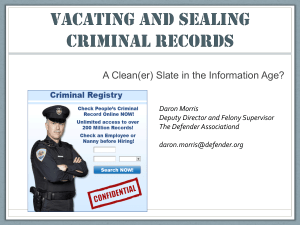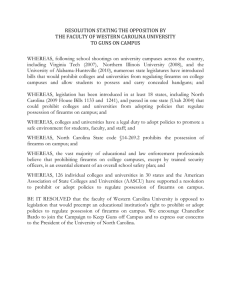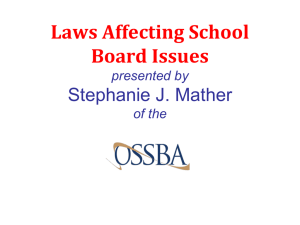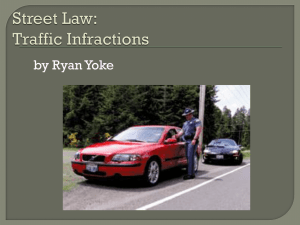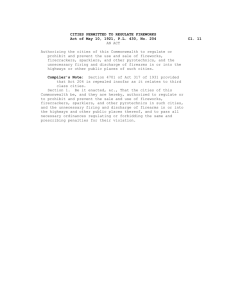AGO 2008 No8 Guns cities ()
advertisement
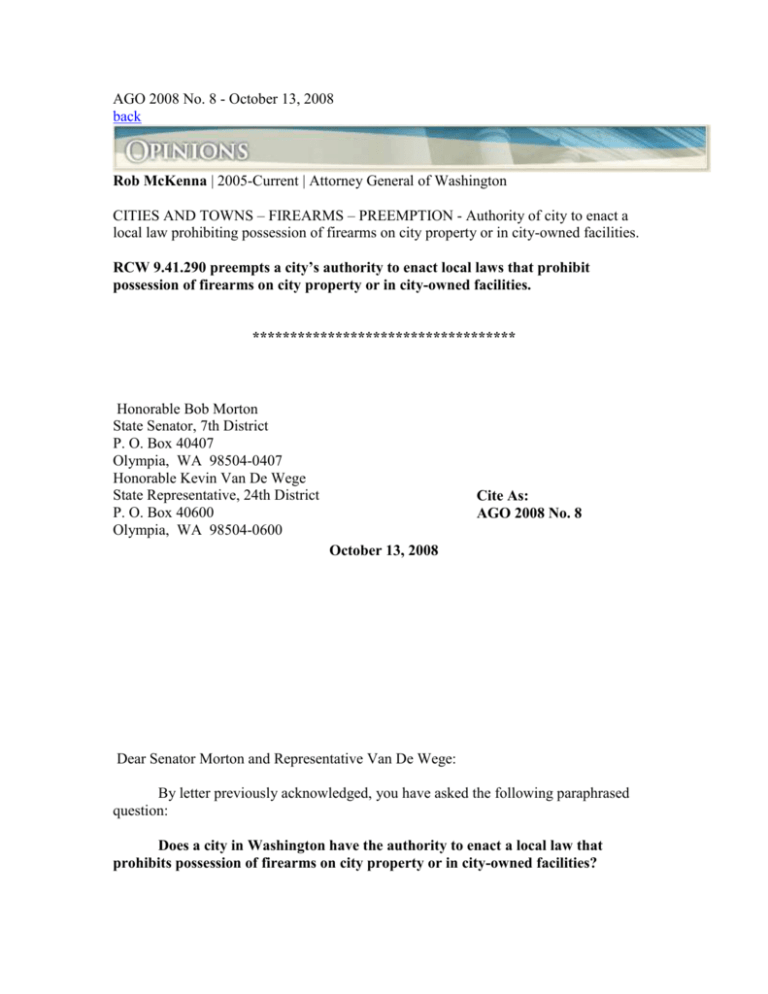
AGO 2008 No. 8 - October 13, 2008 back Rob McKenna | 2005-Current | Attorney General of Washington CITIES AND TOWNS – FIREARMS – PREEMPTION - Authority of city to enact a local law prohibiting possession of firearms on city property or in city-owned facilities. RCW 9.41.290 preempts a city’s authority to enact local laws that prohibit possession of firearms on city property or in city-owned facilities. *********************************** Honorable Bob Morton State Senator, 7th District P. O. Box 40407 Olympia, WA 98504-0407 Honorable Kevin Van De Wege State Representative, 24th District P. O. Box 40600 Olympia, WA 98504-0600 Cite As: AGO 2008 No. 8 October 13, 2008 Dear Senator Morton and Representative Van De Wege: By letter previously acknowledged, you have asked the following paraphrased question: Does a city in Washington have the authority to enact a local law that prohibits possession of firearms on city property or in city-owned facilities? BRIEF ANSWER The answer to your question is no. RCW 9.41.290 “fully occupies and preempts the entire field of firearms regulation” and preempts a city’s authority to adopt firearms laws or regulations of application to the general public, unless specifically authorized by state law. Accordingly, RCW 9.41.290 preempts a city’s authority to enact local laws that prohibit possession of firearms on city property or in city-owned facilities. BACKGROUND Your question deals with the authority of cities to enact laws relating to firearms. Article XI, section 11 of the Washington Constitution provides that “[a]ny county, city, town or township may make and enforce within its limits all such local police, sanitary and other regulations as are not in conflict with general laws.” Const. art. XI, § 11. “This is a direct delegation of the police power as ample within its limits as that possessed by the Legislature itself. It requires no legislative sanction for its exercise so long as the subject-matter is local, and the regulation reasonable and consistent with the general laws.” City of Spokane v. Portch, 92 Wn.2d 342, 346, 596 P.2d 1044 (1979). However, the “plenary police power in regulatory [Original Page 2] matters accorded municipalities by Const. Art. 11, § 11, ceases when the State enacts a general law upon the particular subject, unless there is room for concurrent jurisdiction.” Id. “Preemption occurs when the Legislature states its intention either expressly or by necessary implication to preempt the field.” Brown v. City of Yakima, 116 Wn.2d 556, 560, 807 P.2d 353 (1991). Thus, a city’s authority to enact laws relating to firearms depends upon the general firearms laws enacted by the State. RCW 9.41 sets forth a comprehensive scheme of state firearms regulations. This statutory scheme includes preemption. RCW 9.41.290 provides: The state of Washington hereby fully occupies and preempts the entire field of firearms regulation within the boundaries of the state, including the registration, licensing, possession, purchase, sale, acquisition, transfer, discharge, and transportation of firearms, or any other element relating to firearms or parts thereof, including ammunition and reloader components. Cities, towns, and counties or other municipalities may enact only those laws and ordinances relating to firearms that are specifically authorized by state law, as in RCW 9.41.300, and are consistent with this chapter. Such local ordinances shall have the same penalty as provided for by state law. Local laws and ordinances that are inconsistent with, more restrictive than, or exceed the requirements of state law shall not be enacted and are preempted and repealed, regardless of the nature of the code, charter, or home rule status of such city, town, county, or municipality. RCW 9.41.290 preempts the authority of cities to adopt laws regulating firearms. The question is whether the scope of this preemption extends to prohibiting cities from enacting local law that prohibits possession of firearms on city property or in city-owned facilities. ANALYSIS In determining the scope of the preemption in RCW 9.41.290, the “objective is to determine the legislature’s intent. If the statute’s meaning is plain on its face, then the court must give effect to that plain meaning as an expression of legislative intent.” See State v. Jacobs, 154 Wn.2d 596, 600, 115 P.3d 281 (2005). “The ‘plain meaning’ of a statutory provision is to be discerned from the ordinary meaning of the language at issue, as well as from the context of the statute in which that provision is found, related provisions, and the statutory scheme as a whole.” Id. A statute is ambiguous if it is “subject to more than one reasonable interpretation.” In re the Marriage of Kovacs, 121 Wn.2d 795, 804, 854 P.2d 629 (1993). In this case, the plain meaning of RCW 9.41.290 establishes that the preemptive effect of the statute is substantial. “Preemption occurs when the Legislature states its intention . . . expressly . . . to preempt the field.” Brown, 116 Wn.2d at 560. RCW 9.41.290 expressly preempts the field. RCW 9.41.290 provides in part that the “state of Washington hereby fully occupies and preempts the entire field of firearms regulation within the boundaries of the state”. (Emphasis added.) Not only does RCW 9.41.290 use the words of preemption—“fully occupies and preempts”—it broadly defines the field of firearms regulation to include “the registration, licensing, possession, purchase, sale, acquisition, transfer, discharge, and transportation of [Original Page 3] firearms, or any other element relating to firearms or parts thereof, including ammunition and reloader components.” RCW 9.41.290. Standing alone, the language of RCW 9.41.290 quoted above would establish substantial field preemption. However, RCW 9.41.290 goes on to specifically address the authority of cities to regulate firearms and provides, in part, that “[c]ities, towns, and counties or other municipalities may enact only those laws and ordinances relating to firearms that are specifically authorized by state law, as in RCW 9.41.300, and are consistent with this chapter.” Under RCW 9.41.290, cities may only enact laws and ordinances relating to firearms if two conditions are met. First, cities may only enact laws “that are specifically authorized by state law, as in RCW 9.41.300”. RCW 9.41.290. Second, the cities’ laws must be “consistent with this chapter.” Id. Subject to conditions in the statute, RCW 9.41.300 authorizes cities to enact laws restricting the discharge of firearms in any portion of their respective jurisdictions, restricting the possession of firearms in any stadium or convention center, operated by a city, restricting the areas in their respective jurisdictions in which firearms may be sold, and restricting the location of a business selling firearms to not less than five hundred feet from primary or secondary school grounds. RCW 9.41.300(2)(a)-(b), (3)(a)-(b). [1] The requirement in RCW 9.41.290 that firearms laws adopted by cities be “consistent with this chapter” necessarily implies that inconsistent laws are invalid. RCW 9.41.290 contains additional language, however, that renders this implication explicit. RCW 9.41.290 provides, in part: Local laws and ordinances that are inconsistent with, more restrictive than, or exceed the requirements of state law shall not be enacted and are preempted and repealed, regardless of the nature of the code, charter, or home rule status of such city, town, county, or municipality. (Emphasis added.) In our judgment, the plain language of RCW 9.41.290 demonstrates that the Legislature intended to broadly preempt local laws relating to firearms. Although the language of RCW 9.41.290 is broad, it does not preempt all city authority with respect to firearms. The Supreme Court has considered RCW 9.41.290 on two occasions. In Cherry v. Municipality of Metropolitan Seattle, 116 Wn.2d 794, 808 P.2d 746 (1991), the Court considered whether the Municipality of Metropolitan Seattle (Metro) could discharge an employee who violated Metro’s policy prohibiting employees from carrying concealed weapons. The Court held that “RCW 9.41.290 is intended to preempt regulatory city, town or county firearms laws and ordinances, but does not address internal employment rules limiting on-duty possession of firearms by public employees in the workplace.” Id. at 798 (emphasis added). The Court concluded that “RCW 9.41.290 was enacted to reform that situation in which counties, cities, and towns could each enact conflicting local criminal codes regulating the general public’s possession of firearms.” Id. at 801. Thus, the purpose of RCW 9.41.290 was “to eliminate a [Original Page 4] multiplicity of local laws relating to firearms and to advance uniformity in criminal firearms regulation.” Id. The Supreme Court next considered RCW 9.41.290 in Pacific Northwest Shooting Park Association v. City of Sequim, 158 Wn.2d 342, 144 P.3d 276 (2006). In Pacific Northwest Shooting Park, the Association wanted to hold a gun show in the city convention center. The conditional use permit issued by the City of Sequim imposed three conditions on the ability of licensed and unlicensed gun dealers to sell or exchange firearms. The Association argued that these conditions were preempted by RCW 9.41.290. The Court disagreed. According to the Court, “Cherry supports the general proposition that when a municipality acts in a capacity that is comparable to that of a private party, the preemption clause does not apply.” Pacific Northwest Shooting Park, 158 Wn.2d at 357. The Court concluded that a “municipality acts in a proprietary capacity when it acts as the proprietor of a business enterprise for the private advantage of the municipality and it may exercise its business powers in much the same way as a private individual or corporation.” Id. (citations and internal quotation marks omitted). Therefore, “[b]y issuing a temporary use permit, the city was leasing its property to PNSPA and acting in its private capacity as a property owner.” Id. The Court held that RCW 9.41.290 does not prohibit a private property owner from imposing conditions on the sale of firearms on his or her property. RCW 9.41.290. Applying our reasoning in Cherry, it follows that a municipal property owner like a private property owner may impose conditions related to firearms for the use of its property in order to protect its property interests. For the same reason that a municipal employer may enact policies regarding possession of firearms in the workplace because a private employer may do so, a municipal property owner should be allowed to impose conditions related to sales of firearms on its property if a private property owner may impose them. Pacific Northwest Shooting Park, 158 Wn.2d at 357. The Court explained that the “critical point is that the conditions the city imposed related to a permit for private use of its property. They were not laws or regulations of application to the general public.” Id. Under Cherry and Pacific Northwest Shooting Park, RCW 9.41.290 does not preempt a city’s ability to impose conditions when it is acting in a private capacity. The question is whether this reasoning would apply if a city prohibited the general public from possessing firearms on city property. It is certainly true that RCW 9.41.290 would not preempt a private citizen from prohibiting possession of firearms on his or her property. This prohibition might be enforced by simply refusing to permit someone entry on to the private property with a firearm. However, in this respect, a city is not in the same position as a private citizen. Large parts of city property are generally open to the public. Indeed, citizens may be required to enter city property, for example, to apply for a building permit. For these reasons, neither Cherry nor Pacific Northwest Shooting Park support the view that cities may prohibit the general public from possessing firearms on city property. [Original Page 5] It has been suggested that such a prohibition on the possession of firearms on city property might be enforced through the state’s criminal trespass laws. RCW 9A.52.070 governs first degree criminal trespass and provides: (1) A person is guilty of criminal trespass in the first degree if he knowingly enters or remains unlawfully in a building. (2) Criminal trespass in the first degree is a gross misdemeanor. RCW 9A.52.080 governs second degree criminal trespass and provides: (1) A person is guilty of criminal trespass in the second degree if he knowingly enters or remains unlawfully in or upon premises of another under circumstances not constituting criminal trespass in the first degree. (2) Criminal trespass in the second degree is a misdemeanor. A person “enters or remains unlawfully” when a person is “in or upon premises when he is not then licensed, invited, or otherwise privileged to so enter or remain.” RCW 9A.52.010(3). It is a defense to criminal trespass if the “premises were at the time open to members of the public and the actor complied with all lawful conditions imposed on access to or remaining in the premises”. RCW 9A.52.090(2) (emphasis added). Under the criminal trespass approach, a city would post signs or otherwise notify the public that possession of firearms was prohibited on city property. [2] If an individual did not comply with this requirement, he or she would be charged with criminal trespass. In our judgment, a city does not have the authority to generally prohibit the possession of firearms on city property except to the extent authorized by RCW 9.41.290. Even in the case of criminal trespass, a member of the public is only required to comply with “lawful conditions”. RCW 9A.52.090(2). Prohibiting possession of firearms on city property would not be a lawful condition, because RCW 9.41.290 preempts the power of a city to impose such a prohibition. We reach this conclusion for three reasons. First, breadth of the language in RCW 9.41.290 persuades us that the Legislature intended to prohibit cities from generally prohibiting firearms. Even though Cherry and Pacific Northwest Shooting Park recognized that RCW 9.41.290 does not preempt all city authority to regulate firearms, both cases hold that the purpose of RCW 9.41.290 was “to reform that situation in which counties, cities, and towns could each enact conflicting local criminal codes regulating the general public’s possession of firearms.” Cherry, 116 Wn.2d at 801 (emphasis added); Pacific Northwest Shooting Park, 158 Wn.2d at 356. Thus, the regulation in those cases [Original Page 6] was not directed at the general public’s possession of firearms. As the Court explained, the “critical point is that the conditions the city imposed related to a permit for private use of its property. They were not laws or regulations of application to the general public.” Pacific Northwest Shooting Park, 158 Wn.2d at 357 (emphasis added). Under the facts of your question, the city would prohibit the general public from possessing firearms on city property. Prior to the enactment of RCW 9.41.290, it might have been legal to possess a firearm at a particular place in one city and a crime to possess a firearm in the same place in another city. RCW 9.41.290 was enacted to prevent these conflicting criminal codes. Allowing a city to use criminal trespass to enforce a ban on firearms allows conflicting criminal codes regulating the general public’s possession of firearms. In this respect, it makes little difference to a citizen who is subjected to conflicting criminal codes whether he or she is being prosecuted for the gross misdemeanor of first degree trespass, or for the crime of possession of a firearm. Second, in interpreting a statute “each provision of a statute should be read together (in pari materia) with other provisions in order to determine the legislative intent underlying the entire statutory scheme.” State v. Chapman, 140 Wn.2d 436, 448, 998 P.2d 282 (2000). “The purpose of interpreting statutory provisions together with related provisions is to achieve a harmonious and unified statutory scheme that maintains the integrity of the respective statutes.” Id. Reading RCW 9.41.290 together with other firearms statutes persuades us that the Legislature did not intend to permit cities to prohibit the general public from possessing firearms. The Legislature has expressly prohibited the possession of firearms in specific places. These include (a) restricted access areas of a jail, or of a law enforcement facility, or any place used for the confinement of a certain person, (b) the areas in any building which are used in connection with court proceedings, including courtrooms, jury rooms, judge’s chambers, offices and areas used to conduct court business, waiting areas, and corridors adjacent to areas used in connection with court proceedings, (c) the restricted access areas of certain public mental health facilities, (d) that portion of an establishment classified by the state liquor control board as off-limits to persons under twenty-one years of age, and (e) the restricted access areas of a commercial service airport designated in the airport security plan approved by the federal transportation security administration. RCW 9.41.300(1)(a)-(e). The Legislature also prohibited possession of firearms “while on the site of an outdoor music festival.” RCW 70.108.150. The Legislature has also expressly authorized cities to prohibit firearms in certain places. This includes restricting the discharge of firearms in any portion of their respective jurisdictions, restricting the possession of firearms in any stadium or convention center, operated by a city, restricting the areas in their respective jurisdictions in which firearms may be sold, and restricting the location of a business selling firearms to not less than five hundred feet from primary or secondary school grounds. RCW 9.41.300(2)(a)-(b), (3)(a)-(b). The Legislature has carefully set out the places where the general public is prohibited from possessing firearms. “Where a statute specifically designates the things upon which it operates, there is an inference that the Legislature intended all omissions.” In re Hopkins, 137 Wn.2d 897, 901, 976 P.2d 616 (1999). We conclude that the Legislature did not intend that the possession of firearms would be prohibited in the places that were not listed. This conclusion is buttressed by the fact that the Legislature's prohibition of firearms is very narrow. The Legislature prohibited the possession of firearms in the “restricted access areas of a jail, or of a [Original Page 7] law enforcement facility, or any place used for the confinement of [certain] person[s]” but “[r]estricted access areas do not include common areas of egress or ingress open to the general public”. RCW 9.41.300(1)(a). The Legislature prohibited possession of firearms in certain “restricted areas” of courthouses. However, the Legislature provided that the “restricted areas do not include common areas of ingress and egress to the building that is used in connection with court proceedings, when it is possible to protect court areas without restricting ingress and egress to the building. The restricted areas shall be the minimum necessary to fulfill the objective of this subsection”. RCW 9.41.300(1)(b). The Legislature prohibited possession of firearms in the restricted areas of certain mental health facilities but, again, the Legislature provided that “[r]estricted access areas do not include common areas of egress and ingress open to the general public”. RCW 9.41.300(1)(c). Even the restricted areas of airports where firearms are prohibited do not include “airport drives, general parking areas and walkways, and shops and areas of the terminal that are outside the screening checkpoints and that are normally open to unscreened passengers or visitors to the airport.” RCW 9.41.300(1)(e). Thus, even when the Legislature prohibited the possession of firearms, it did so only in restricted areas. The Legislature did not intend to impose a general prohibition on a citizen’s ability to possess a firearm. Third, the evolution of the preemption of local firearms laws establishes that the Legislature intended RCW 9.41.290 to broadly preempt local authority and to prohibit local government from prohibiting citizens from possessing firearms. In 1935, Washington adopted firearms laws “modeled after the uniform firearms act which was approved by the National Conference of Commissioners on Uniform State Laws, in 1930. See 1930 Handbook of National Conference of Commissioners on Uniform State Laws and Proceedings, 562-567.” Olsen v. Delmore, 48 Wn.2d 545, 548, 295 P.2d 324 (1956). Laws of 1935, ch. 172. The 1935 law did not contain a provision similar to RCW 9.41.290 that addressed the preemption of local authority to adopt firearms laws. In 1961, the Legislature reenacted the state’s firearms laws. Laws of 1961, ch. 124. The 1961 law provided that “[a]ll laws or parts of laws of the state of Washington, its subdivisions and municipalities inconsistent herewith are hereby preempted and repealed.” Laws of 1961, ch. 124, § 14. Although the 1961 law preempted and repealed inconsistent local law, it did not generally preempt local authority to adopt firearms laws that were not inconsistent with state firearms law. This was the holding in Second Amendment Foundation v. City of Renton, 35 Wn. App. 583, 668 P.2d 596 (1983). In Second Amendment Foundation, Renton adopted an ordinance prohibiting the possession of firearms where alcoholic beverages are dispensed by the drink. The plaintiff argued that this ordinance was preempted by section 12 of the 1961 law. The Court of Appeals rejected this argument, because the “provision served only to repeal inconsistent municipal legislation in effect in 1961, and has no bearing on the present case.” Second Amendment Foundation, 35 Wn. App. at 588. The court held that there was no express preemption of local authority to regulate firearms. The court explained that a “careful examination of the Uniform Firearms Act, RCW Ch. 9.41, demonstrates no express preemption concerning the possession of firearms on premises where liquor is sold by the drink. The legislature has not indicated an intention to preempt municipal regulation in all areas of gun control. The power of municipalities to so legislate survives.” Second Amendment Foundation, 35 Wn. App. at 588. [Original Page 8] The Court next considered whether there was a conflict between state law and the Renton ordinance. The Court concluded that there was no conflict, because Washington laws “do not expressly state an unqualified right to be in possession of a firearm at any time or place. The Renton ordinance does not purport to contradict or restrict any provision of the statute. Therefore, the statute and ordinance are not inconsistent.” Id. at 588-89. Thus, “[w]hile an absolute and unqualified local prohibition against possession of a pistol by the holder of a state permit would conflict with state law, an ordinance which is a limited prohibition reasonably related to particular places and necessary to protect the public safety, health, morals and general welfare is not preempted by state statute.” Id. at 589. In 1983, the Legislature adopted RCW 9.41.290. Laws of 1983, ch. 232, § 12. The 1983 version of RCW 9.41.290 provided that “[c]ities, towns, and counties may enact only those laws and ordinances relating to firearms that are consistent with this chapter. Local laws and ordinances that are inconsistent with, more restrictive than, or exceed the requirements of state law shall not be enacted.” Laws of 1983, ch. 232, § 12. Although RCW 9.41.290 was enacted after Second Amendment Foundation was argued, the Court explained that section 12 “prohibits the enactment of local ordinances inconsistent with the requirements of RCW Ch. 9.41. It does not militate against the result reached here.” Second Amendment Foundation, 35 Wn. App. at 588 n.3. Thus, the 1983 version of RCW 9.41.290 only preempted inconsistent local firearms laws. In an addendum to AGO 1983 No. 14 (Addendum dated September 22, 1983), we discussed the limited scope of the preemptive language of section 12. We noted that the critical issue involves the very limited preemptive effect of the language employed in § 12 of SSB 3782 (now chapter 232, Laws of 1983). It has, unfortunately, become apparent to us since AGO 1983 No. 14 was issued that some proponents and many supporters of that bill were misled into thinking that the language of § 12 was sufficient to prevent the continuing enactment or enforcement of local ordinances addressing the kinds of places where weapons might be possessed-with or without a permit. Such ordinances, in the minds of many, have led to a confusing patchwork of prohibitions from one locality to the next, across the state. AGO 1983 No. 14 (Addendum dated September 22, 1983) at 1 (emphasis added). We explained that it “is most certainly within the power of the legislature to effect a policy that such a patchwork situation will not exist.” Id. Also, we suggested that language such as “preemption” or “occupies the field” would accomplish this goal: If the legislature intends to accomplish this policy through the technique of “preemption” there are numerous judicial decisions, both within our own state and elsewhere, that contain examples of appropriate terminology that should be used. For, quite simply, preemption indicates a complete take over of a field of activity to the exclusion of all local actions, regulations or interference-and thus, if that is the intention of the legislature, the best and most effective way to manifest that intent would be to use the term “preemption” or “occupies the field” or similar terms. [Original Page 9] AGO 1983 No. 14 (Addendum dated September 22, 1983) at 1-2 (emphasis added). In 1985, the Legislature amended RCW 9.41.290. Laws of 1985, ch. 428, § 1. The amendment included the use of both of the terms “preemption” and “occupies the field” suggested in AGO 1983 No. 14. The amendment, in bill draft form, provided: The state of Washington hereby fully occupies and preempts the entire field of firearms regulation within the boundaries of the state, including the registration, licensing, possession, purchase, sale, acquisition, transfer, discharge, and transportation of firearms, or any other element relating to firearms or parts thereof, including ammunition and reloader components. Cities, towns, and counties or other municipalities may enact only those laws and ordinances relating to firearms that are specifically authorized by state law and are consistent with this chapter. Such local ordinances shall have the same or lesser penalty as provided for by state law. Local laws and ordinances that are inconsistent with, more restrictive than, or exceed the requirements of state law shall not be enacted and are preempted and repealed, regardless of the nature of the code, charter, or home rule status of such city, town, county, or municipality. Laws of 1985, ch. 428, § 1 (italicized emphasis added). The 1985 legislation also added RCW 9.41.300 to RCW 9.41. Laws of 1985, ch. 428, § 2. RCW 9.31.300 prohibited possession of firearms in certain places. Laws of 1985, ch. 428, § 2(1). The statute also provided: “Notwithstanding RCW 9.41.290, cities, towns, counties, and other municipalities may enact laws and ordinances” restricting the discharge and possession of firearms in certain places. Laws of 1985, ch. 428, § 2(2). The sequence of events leading to the 1985 amendment of RCW 9.41.290 persuades us that the Legislature intended to preempt all local authority to impose a prohibition on the public’s ability to possess firearms. The use of the terms “preempt” and “occupies the field” confirm that RCW 9.41.290 was intended to broadly preempt local authority to adopt a ban on the possession of firearms. The 1994 amendment to RCW 9.41.290 and .300 also confirms this view. In 1993, the Court of Appeals decided City of Seattle v. Ballsmider, 71 Wn. App. 159, 856 P.2d 1113 (1993). In Ballsmider, the defendant violated a Seattle ordinance by standing on the back porch of his Seattle residence and firing a gun into the air. The Seattle Municipal Court imposed a sentence of 365 days’ confinement with 360 days suspended and a $5,000 fine with $4,500 suspended. The defendant argued that “the penalty imposed by local firearms ordinances cannot exceed that imposed by the State firearms statutes, and that his sentence was therefore contrary to law because his sentence and the maximum penalty under SMC 12A.28.050 (365 days and $5,000) exceed the maximum penalty allowed under RCW 9.41.230 (90 days and $1,000).” Ballsmider, 71 Wn. App. at 161. The Court rejected this argument, pointing to the language in RCW 9.41.300(2): “Notwithstanding RCW 9.41.290.” According to the Court: The definition of “notwithstanding” is “in spite of”, which in turn is defined as “in defiance of, regardless of. . .” Under these definitions, “notwithstanding RCW 9.41.290” means “regardless of anything in RCW 9.41.290.” Had the Legislature [Original Page 10] intended that local governments disregard only contrary provisions or restrictions in the preemption statute, it could have easily said “notwithstanding any contrary provisions or restrictions in RCW 9.41.290” instead of “notwithstanding RCW 9.41.290.” Thus, the effect of “notwithstanding RCW 9.41.290” is that the preemption statute and its restrictions, including its penalty restrictions, are to be disregarded and have absolutely no bearing on laws enacted pursuant to RCW 9.41.300(2)(a). Ballsmider, 71 Wn. App. at 162–163 (emphasis added) (citations omitted). The Court concluded that this reading of RCW 9.41.300(2) was consistent with RCW 9.41.290. According to the Court, the preemption language in RCW 9.41.290 applies to the entire range of firearms regulation, including “registration, licensing, possession, purchase, sale, acquisition, transfer, discharge, and transportation of firearms . . .” (Emphasis added). RCW 9.41.300(2) and its “[n]otwithstanding RCW 9.41.290” language merely give local governments authority, without penalty or other restrictions, to enact laws regarding the discharge of firearms in areas where there is a reasonable likelihood that humans, domestic animals, or property will be jeopardized. This limited exception does not swallow or render meaningless the general preemption statute which, as noted above, applies to much more than the regulation of the discharge of firearms. Ballsmider, 71 Wn. App. at 163-64. In 1994, the Legislature amended RCW 9.41.290 and RCW 9.41.300. Laws of 1994, 1st Sp. Sess., ch. 7, §§ 428, 429. In bill draft form, the amendments to RCW 9.41.290 provided: The state of Washington hereby fully occupies and preempts the entire field of firearms regulation within the boundaries of the state, including the registration, licensing, possession, purchase, sale, acquisition, transfer, discharge, and transportation of firearms, or any other element relating to firearms or parts thereof, including ammunition and reloader components. Cities, towns, and counties or other municipalities may enact only those laws and ordinances relating to firearms that are specifically authorized by state law, as in RCW 9.41.300, and are consistent with this chapter. Such local ordinances shall have the same ((or lesser)) penalty as provided for by state law. Local laws and ordinances that are inconsistent with, more restrictive than, or exceed the requirements of state law shall not be enacted and are preempted and repealed, regardless of the nature of the code, charter, or home rule status of such city, town, county, or municipality. Laws of 1994, 1st Sp. Sess., ch. 7, § 428. In bill draft form, RCW 9.41.300, which provides limited authority to municipalities to enact ordinances relating to firearms was amended in part to provide: [Original Page 11] (2) ((Notwithstanding RCW 9.41.290,)) Cities, towns, counties, and other municipalities may enact laws and ordinances: .... (4) Violations of local ordinances adopted under subsection (2) of this section must have the same penalty as provided for by state law. Laws of 1994, 1st Sp. Sess., ch. 7, § 429(2), (4). The 1994 amendments had the effect of changing the law as it was interpreted by the court in Ballsmider, which read the phrase “notwithstanding RCW 9.41.290” in RCW 9.41.300 as “allow[ing] local governments relatively unlimited authority” in the specific areas covered by RCW 9.41.300(2). Ballsmider, 71 Wn. App. at 163. The repeal of the “notwithstanding” language supports the interpretation that the Legislature intended that local governments have limited ability to regulate firearms. The 1994 amendments require that the penalties be the same as provided for by state law. The amendments even eliminate the authority of local governments to impose lesser penalties. The addition of the phrase “as in RCW 9.41.300” to RCW 9.41.290 further limits local authority to regulate firearms. Local governments may only regulate if “specifically authorized by state law, as in RCW 9.41.300”. Laws of 1994, 1st Sp. Sess., ch. 7, § 428. To summarize, RCW 9.41.290 “fully occupies and preempts the entire field of firearms regulation within the boundaries of the state”. While RCW 9.41.290 does not preempt all city authority with regard to firearms, it does preempt a city’s authority to adopt firearms laws or regulations of application to the general public, unless specifically authorized by state law. Accordingly, RCW 9.41.290 preempts a city’s authority to enact local laws that prohibit possession of firearms on city property or in city-owned facilities. We trust that this opinion will be of assistance to you. Sincerely, ROB MCKENNA Attorney General WILLIAM B. COLLINS Deputy Solicitor General :pmd [1] The complete text of RCW 9.41.300 is attached. [2] There are different ways in which a city might take action to prohibit firearms on city property. One would be for the city legislative authority to enact an ordinance imposing the prohibition. Another would be for a city official to impose the prohibition, if he or she were authorized by city law to impose conditions on access to city property. In our view, the answer to this question does not turn on the manner in which the prohibition might be imposed.

